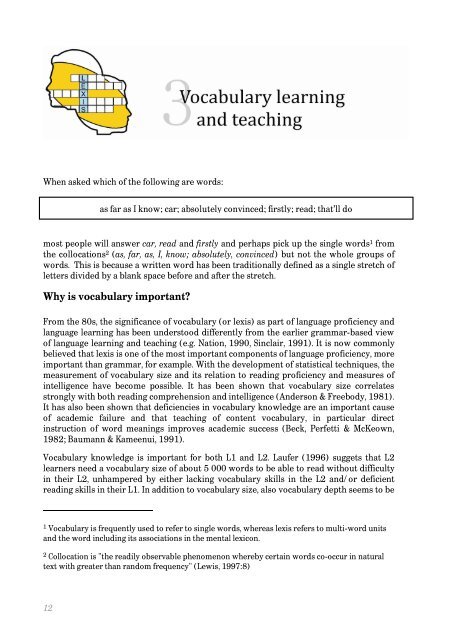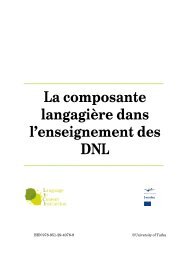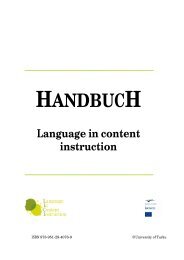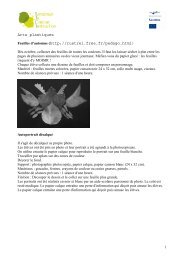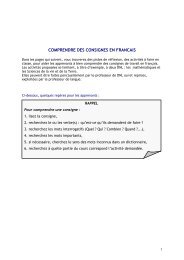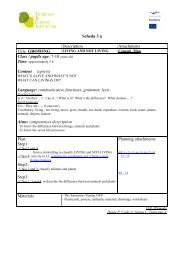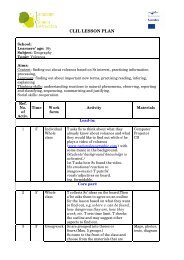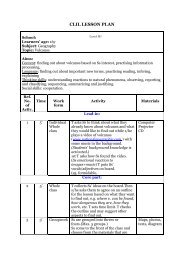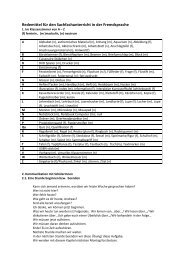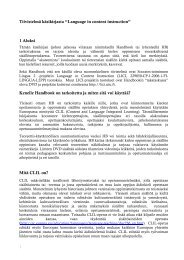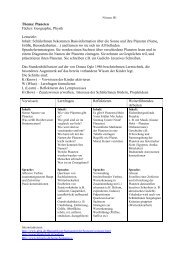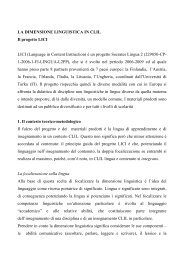Language in content instruction - LICI Project
Language in content instruction - LICI Project
Language in content instruction - LICI Project
You also want an ePaper? Increase the reach of your titles
YUMPU automatically turns print PDFs into web optimized ePapers that Google loves.
When asked which of the follow<strong>in</strong>g are words:<br />
most people will answer car, read and firstly and perhaps pick up the s<strong>in</strong>gle words 1 from<br />
the collocations 2 (as, far, as, I, know; absolutely, conv<strong>in</strong>ced) but not the whole groups of<br />
words. This is because a written word has been traditionally def<strong>in</strong>ed as a s<strong>in</strong>gle stretch of<br />
letters divided by a blank space before and after the stretch.<br />
Why is vocabulary important?<br />
From the 80s, the significance of vocabulary (or lexis) as part of language proficiency and<br />
language learn<strong>in</strong>g has been understood differently from the earlier grammar-based view<br />
of language learn<strong>in</strong>g and teach<strong>in</strong>g (e.g. Nation, 1990, S<strong>in</strong>clair, 1991). It is now commonly<br />
believed that lexis is one of the most important components of language proficiency, more<br />
important than grammar, for example. With the development of statistical techniques, the<br />
measurement of vocabulary size and its relation to read<strong>in</strong>g proficiency and measures of<br />
<strong>in</strong>telligence have become possible. It has been shown that vocabulary size correlates<br />
strongly with both read<strong>in</strong>g comprehension and <strong>in</strong>telligence (Anderson & Freebody, 1981).<br />
It has also been shown that deficiencies <strong>in</strong> vocabulary knowledge are an important cause<br />
of academic failure and that teach<strong>in</strong>g of <strong>content</strong> vocabulary, <strong>in</strong> particular direct<br />
<strong>in</strong>struction of word mean<strong>in</strong>gs improves academic success (Beck, Perfetti & McKeown,<br />
1982; Baumann & Kameenui, 1991).<br />
Vocabulary knowledge is important for both L1 and L2. Laufer (1996) suggets that L2<br />
learners need a vocabulary size of about 5 000 words to be able to read without difficulty<br />
<strong>in</strong> their L2, unhampered by either lack<strong>in</strong>g vocabulary skills <strong>in</strong> the L2 and/or deficient<br />
read<strong>in</strong>g skills <strong>in</strong> their L1. In addition to vocabulary size, also vocabulary depth seems to be<br />
1 Vocabulary is frequently used to refer to s<strong>in</strong>gle words, whereas lexis refers to multi-word units<br />
and the word <strong>in</strong>clud<strong>in</strong>g its associations <strong>in</strong> the mental lexicon.<br />
2 Collocation is "the readily observable phenomenon whereby certa<strong>in</strong> words co-occur <strong>in</strong> natural<br />
text with greater than random frequency" (Lewis, 1997:8)<br />
12<br />
as far as I know; car; absolutely conv<strong>in</strong>ced; firstly; read; that’ll do


